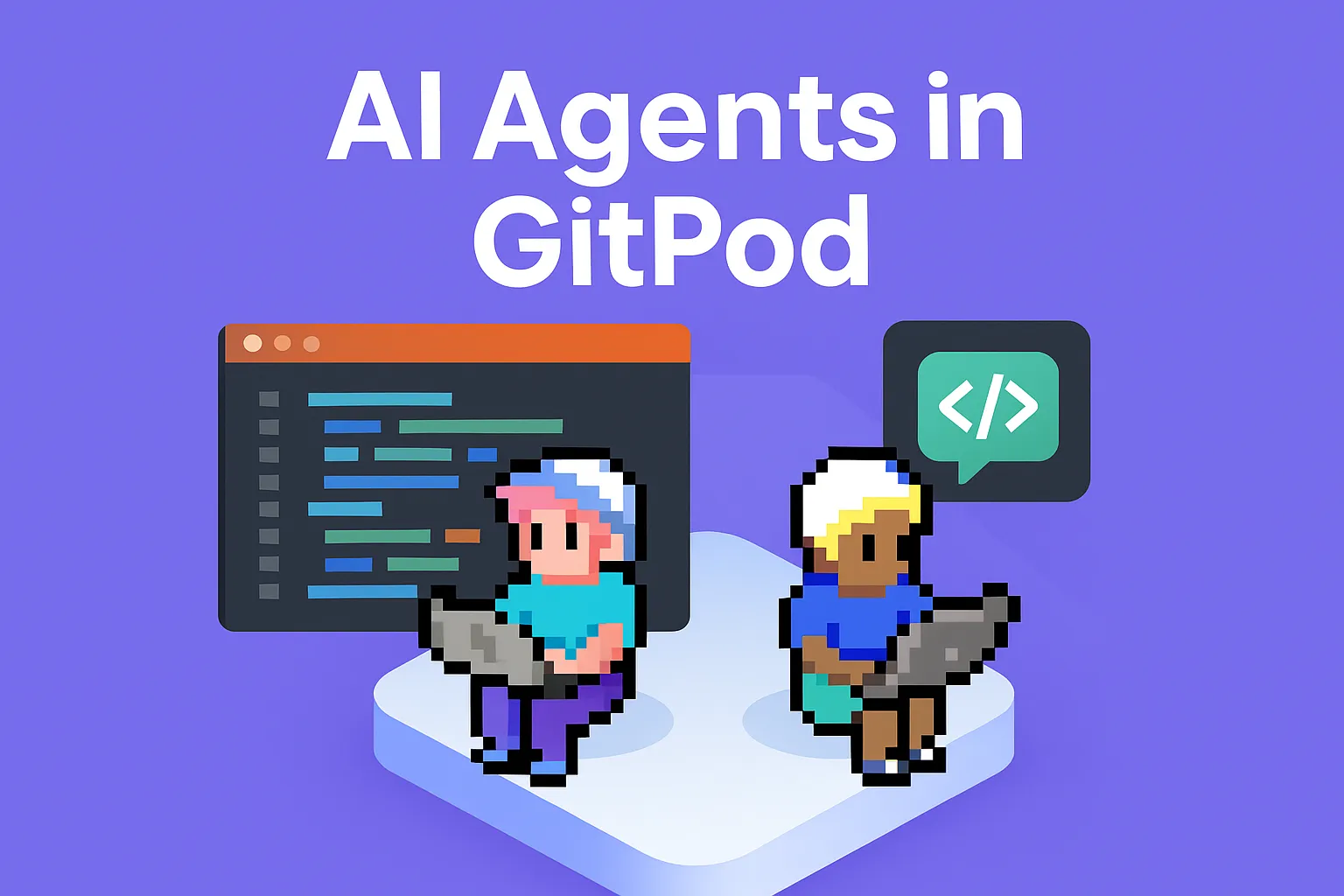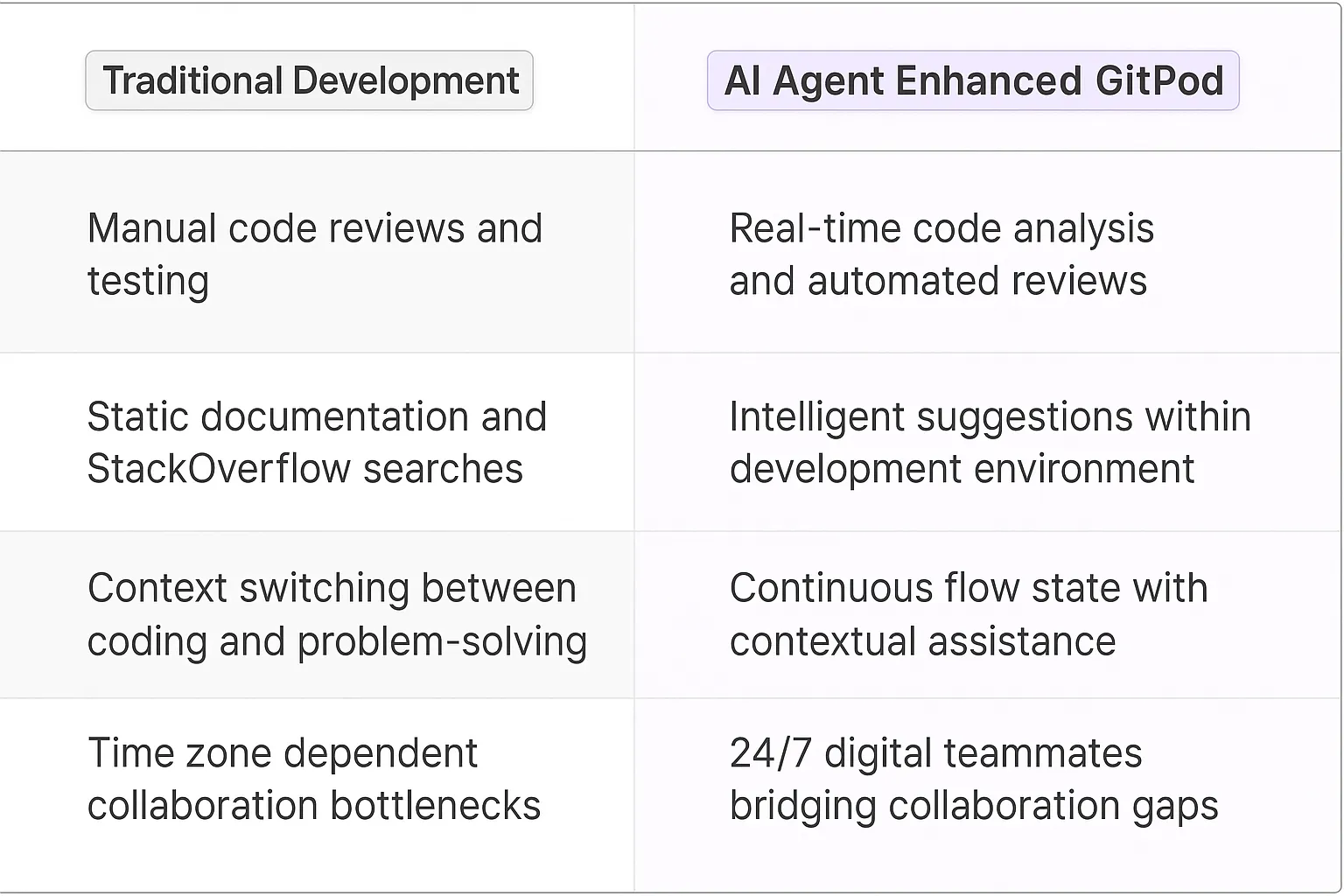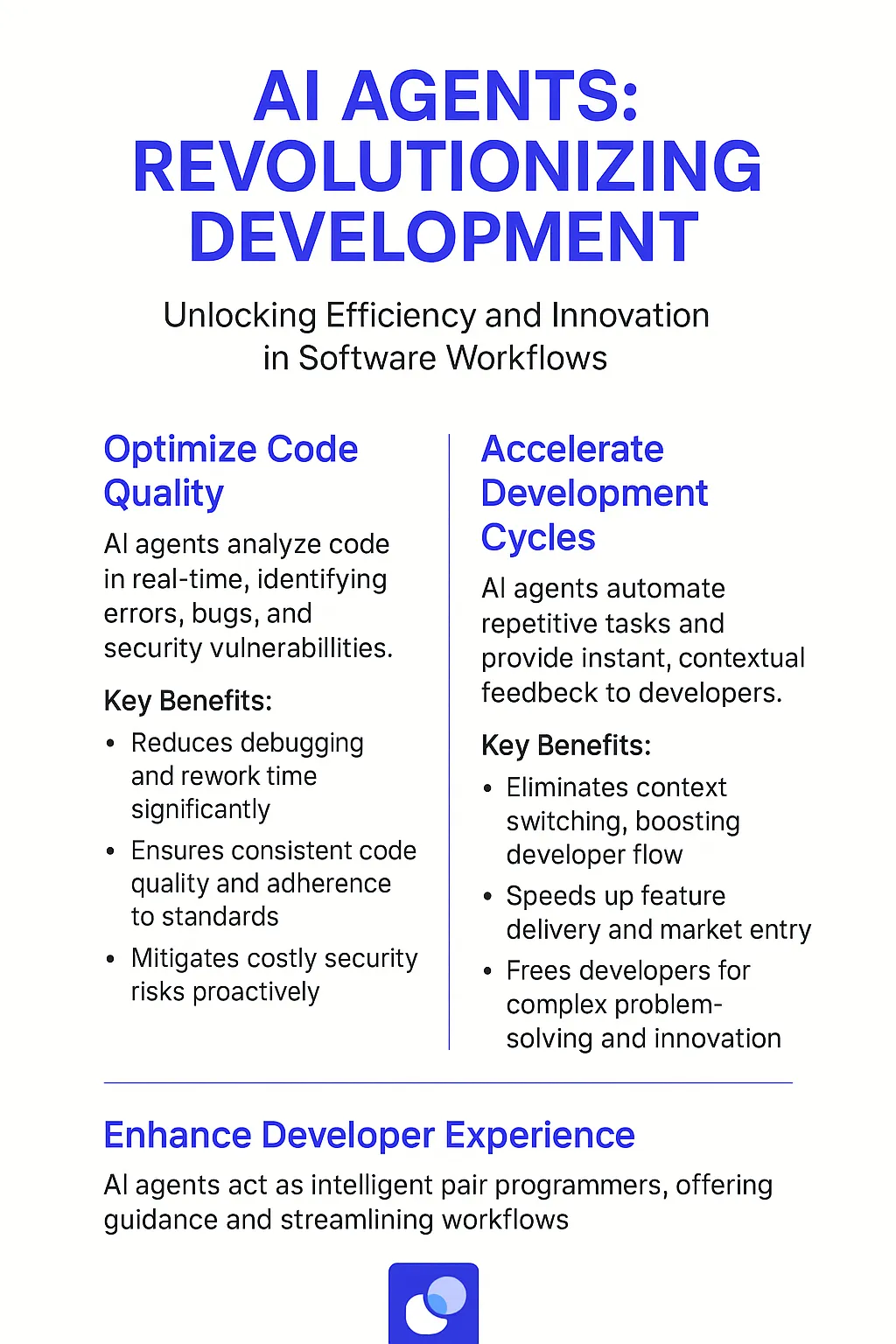GitPod
Understanding GitPod's Cloud Development Platform
GitPod is a cloud development environment platform that enables developers to spin up ready-to-code workspaces in seconds. It provides automated, reproducible development environments that run in the browser, eliminating the "it works on my machine" problem. The platform integrates seamlessly with popular version control systems and offers powerful collaboration features.
Key Features of GitPod
- Browser-based development environments that mirror production setups
- Pre-built workspaces that launch instantly
- Deep integration with GitHub, GitLab, and Bitbucket
- Automated environment configuration
- Built-in collaboration tools
- Docker-based workspace isolation

Benefits of AI Agents for GitPod
What would have been used before AI Agents?
Software developers working in GitPod traditionally relied on static documentation, StackOverflow threads, and direct messages to teammates when facing coding challenges. They'd spend hours searching through documentation, waiting for responses from busy colleagues, or debugging issues through trial and error. The context switching between coding and searching for solutions created significant cognitive load and slowed down development cycles.
What are the benefits of AI Agents?
AI Agents transform the GitPod development experience by functioning as expert pair programmers who never sleep. They provide real-time code suggestions, identify potential bugs before they become problems, and offer contextual documentation exactly when needed.
The most compelling advantage is the elimination of context switching. Developers maintain their flow state while receiving intelligent suggestions directly within their coding environment. When facing a tricky implementation, instead of opening multiple browser tabs or interrupting colleagues, they can have a focused technical discussion with their digital teammate.
These AI Agents also excel at pattern recognition across large codebases. They can spot inconsistencies in coding style, identify security vulnerabilities, and suggest optimizations based on analyzing millions of similar code patterns. This level of analysis would be impossible for human developers to maintain consistently.
For teams working across time zones, AI Agents bridge the collaboration gap by providing immediate feedback and code reviews. They learn from the team's coding practices and maintain consistent standards 24/7, reducing the bottlenecks that typically occur when waiting for human review.
The compound effect of these benefits is significant: faster development cycles, higher code quality, and more efficient use of developer cognitive resources. Teams using AI Agents in GitPod report spending more time solving core business problems rather than wrestling with technical implementation details.

Potential Use Cases of AI Agents with GitPod
Processes
- Code review automation that catches common patterns and suggests improvements based on project-specific standards
- Environment setup optimization by analyzing workspace configurations and recommending performance enhancements
- Automated documentation generation that maintains consistency with existing codebase patterns
- Git workflow management with intelligent branch organization and merge conflict resolution
- Development environment synchronization across team members with smart configuration management
Tasks
- Real-time code analysis providing contextual suggestions for security vulnerabilities and best practices
- Dependency management with proactive updates and compatibility checks
- Test case generation based on function signatures and usage patterns
- Automated code refactoring suggestions that align with team coding standards
- Resource optimization through intelligent workspace cleanup and cache management
Impact on Development Workflows
The integration of AI agents into GitPod transforms development environments from static workspaces into dynamic coding partners. When developers push code, AI agents analyze patterns across the entire codebase, identifying opportunities for optimization that humans might miss during rapid development cycles.
These digital teammates excel at repetitive tasks like formatting, linting, and basic code reviews, allowing developers to focus on complex problem-solving and architecture decisions. The most significant impact comes from their ability to learn project-specific patterns and apply them consistently across the entire development process.
Advanced Integration Scenarios
GitPod AI agents shine in complex development scenarios where they can analyze historical code changes, predict potential issues, and suggest optimizations. They excel at identifying patterns in successful pull requests and applying those insights to new code submissions.
The agents can maintain a continuous understanding of the codebase, offering contextual suggestions that become more refined as the project evolves. This creates a feedback loop where development practices improve organically based on accumulated project knowledge.
Future Development Potential
The next evolution of GitPod AI agents points toward predictive development environments that anticipate developer needs before they arise. This includes automatic resource allocation, intelligent code completion that understands business logic, and automated testing strategies that evolve with the codebase.
As these systems mature, they'll move beyond simple code analysis to become true development partners, capable of understanding and contributing to architectural decisions while maintaining the human-centric nature of software development.

Industry Use Cases
AI agents integrated with GitPod transform how development teams operate across multiple sectors. The combination creates powerful workflows that go beyond basic code assistance. From startups to enterprise organizations, teams leverage these digital teammates to tackle complex development challenges while maintaining their existing GitPod environment.
The real power emerges when AI agents tap into GitPod's cloud development capabilities - enabling developers to maintain context and continuity as they switch between workspaces and projects. This integration particularly shines in scenarios requiring rapid prototyping, code review automation, and collaborative troubleshooting.
Development teams across industries have discovered unique ways to leverage this technology pairing. Financial services firms use it to maintain strict security protocols while accelerating development. Educational institutions integrate it into their computer science programs for hands-on learning. Tech startups rely on it to maintain development velocity with limited resources.
The following industry examples demonstrate how organizations are putting these capabilities to work in their daily operations, showcasing practical applications that deliver measurable impact.
Software Development Teams Level Up with GitPod AI Agents
Software development teams face mounting pressure to ship code faster while maintaining quality and managing technical debt. GitPod AI agents fundamentally transform how development teams operate by serving as always-on digital teammates that handle the heavy lifting of code reviews, testing, and documentation.
A typical enterprise development team of 10-15 engineers spends roughly 30% of their time on code reviews and testing. GitPod AI agents can analyze pull requests in real-time, flagging potential issues around security vulnerabilities, performance bottlenecks, and compliance violations before they make it to production. This shifts the team's focus from repetitive checks to strategic technical decisions.
The impact compounds across the development lifecycle. When integrated into CI/CD pipelines, these AI agents automatically generate comprehensive test coverage, validate API contracts, and ensure documentation stays current with code changes. For a team shipping multiple releases per week, this automation reclaims hundreds of engineering hours per month.
Beyond the immediate productivity gains, GitPod AI agents also preserve and spread institutional knowledge. They learn from historical code reviews, bug reports, and architecture decisions to guide newer team members toward established patterns and best practices. This creates a virtuous cycle where the AI agents become more valuable as they interact with more of the codebase and development workflows.
The most forward-thinking software teams are already treating GitPod AI agents as essential members of their development process. Those who delay adoption risk falling behind as AI-augmented teams ship higher quality code at an unprecedented pace.
E-commerce Companies Scale Development with GitPod AI Agents
E-commerce development teams operate in an environment where every millisecond of page load time directly impacts revenue. GitPod AI agents are becoming critical players in helping these teams maintain high-performance codebases while rapidly iterating on features that drive conversion.
The typical e-commerce platform contains millions of lines of code spanning frontend components, payment processing, inventory management, and analytics. GitPod AI agents excel at maintaining this complexity by continuously analyzing code dependencies, identifying potential performance regressions, and ensuring new features don't break existing customer journeys.
Take a major online retailer handling $500M+ in annual transactions. Their development team integrated GitPod AI agents to monitor critical paths in their checkout flow. The AI flags any code changes that could impact payment processing speeds or introduce latency in product catalog queries. This proactive monitoring has reduced customer-impacting incidents by 47% while enabling the team to ship new features 2.5x faster.
The network effects are particularly powerful in e-commerce contexts. As these AI agents process more code reviews and bug reports, they build sophisticated models of what "good" looks like for everything from mobile optimization to SEO-friendly markup. This knowledge gets automatically applied across all new pull requests, creating a continuous improvement loop.
E-commerce teams that leverage GitPod AI agents effectively find themselves with a powerful advantage: they can move faster on customer-facing innovations while maintaining the stability their business depends on. The most sophisticated teams are already treating these AI capabilities as a core part of their development stack rather than just a nice-to-have tool.
Considerations and Challenges
Implementing AI agents in GitPod environments requires careful navigation of both technical complexities and operational hurdles. The integration process demands strategic planning and a deep understanding of development workflows.
Technical Challenges
Memory management becomes critical when running AI agents alongside development environments. GitPod containers have finite resources, and AI models can consume significant RAM and processing power. Teams need to optimize their agent configurations to prevent performance degradation of core development tasks.
Authentication and security protocols require special attention. AI agents need appropriate access levels to repositories and workspaces while maintaining GitPod's security standards. Implementing proper token management and scope limitations prevents unauthorized access without hampering agent functionality.
Version compatibility between AI agents and GitPod's infrastructure demands ongoing maintenance. As GitPod releases updates, teams must ensure their AI implementations remain stable and functional across different versions.
Operational Challenges
Developer workflow integration presents nuanced challenges. Teams must carefully design interaction patterns that enhance rather than disrupt existing development processes. The agent should complement Git operations, code reviews, and testing procedures without creating additional cognitive load.
Cost management becomes more complex with AI agent usage. Teams need to implement monitoring systems to track computational resources and API calls, preventing unexpected expenses while maintaining optimal performance.
Training and adoption require dedicated resources. Developers need time to understand agent capabilities and limitations. Creating clear documentation and usage guidelines helps teams leverage AI features effectively while avoiding common pitfalls.
Data privacy considerations affect implementation choices. Teams must establish clear policies about what code and information AI agents can access and process, especially when dealing with sensitive or proprietary code bases.
The Future of Intelligent Development Environments
The marriage of GitPod and AI Agents represents a significant leap forward in development productivity. These digital teammates enhance every aspect of the development lifecycle - from code generation to testing and deployment. Teams that embrace this technology gain a competitive edge through faster iteration cycles and higher quality output.
The network effects of AI Agents in GitPod environments compound over time as they learn from codebases and team practices. Forward-thinking development teams recognize that this isn't just about automation - it's about creating an intelligent development environment that grows smarter with each interaction.
As AI technology continues to evolve, the capabilities of these digital teammates will expand, making them increasingly valuable partners in the software development process. The teams that invest in understanding and leveraging these tools today will be best positioned to build the software of tomorrow.













